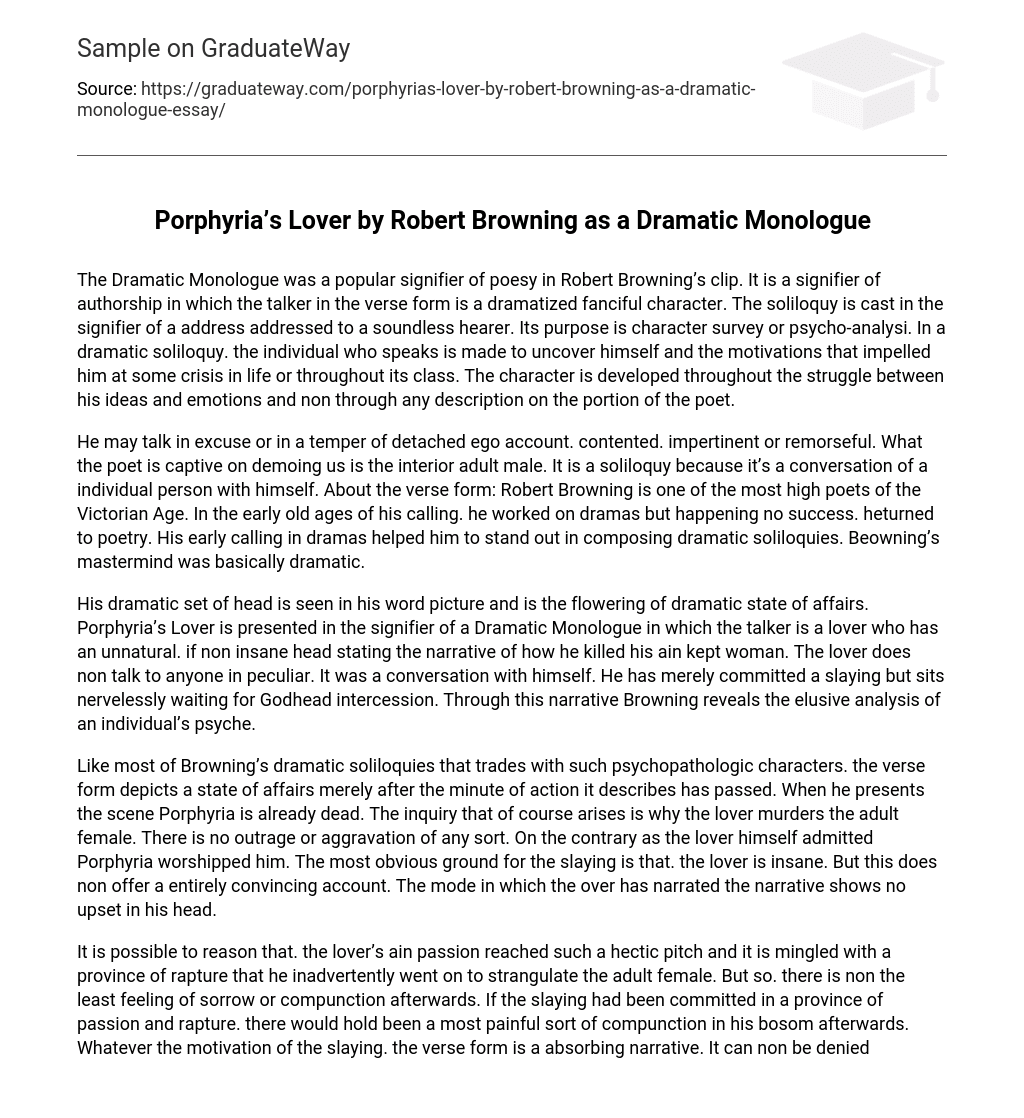The Dramatic Monologue was a popular signifier of poesy in Robert Browning’s clip. It is a signifier of authorship in which the talker in the verse form is a dramatized fanciful character. The soliloquy is cast in the signifier of a address addressed to a soundless hearer. Its purpose is character survey or psycho-analysi. In a dramatic soliloquy. the individual who speaks is made to uncover himself and the motivations that impelled him at some crisis in life or throughout its class. The character is developed throughout the struggle between his ideas and emotions and non through any description on the portion of the poet.
He may talk in excuse or in a temper of detached ego account. contented. impertinent or remorseful. What the poet is captive on demoing us is the interior adult male. It is a soliloquy because it’s a conversation of a individual person with himself. About the verse form: Robert Browning is one of the most high poets of the Victorian Age. In the early old ages of his calling. he worked on dramas but happening no success. heturned to poetry. His early calling in dramas helped him to stand out in composing dramatic soliloquies. Beowning’s mastermind was basically dramatic.
His dramatic set of head is seen in his word picture and is the flowering of dramatic state of affairs. Porphyria’s Lover is presented in the signifier of a Dramatic Monologue in which the talker is a lover who has an unnatural. if non insane head stating the narrative of how he killed his ain kept woman. The lover does non talk to anyone in peculiar. It was a conversation with himself. He has merely committed a slaying but sits nervelessly waiting for Godhead intercession. Through this narrative Browning reveals the elusive analysis of an individual’s psyche.
Like most of Browning’s dramatic soliloquies that trades with such psychopathologic characters. the verse form depicts a state of affairs merely after the minute of action it describes has passed. When he presents the scene Porphyria is already dead. The inquiry that of course arises is why the lover murders the adult female. There is no outrage or aggravation of any sort. On the contrary as the lover himself admitted Porphyria worshipped him. The most obvious ground for the slaying is that. the lover is insane. But this does non offer a entirely convincing account. The mode in which the over has narrated the narrative shows no upset in his head.
It is possible to reason that. the lover’s ain passion reached such a hectic pitch and it is mingled with a province of rapture that he inadvertently went on to strangulate the adult female. But so. there is non the least feeling of sorrow or compunction afterwards. If the slaying had been committed in a province of passion and rapture. there would hold been a most painful sort of compunction in his bosom afterwards. Whatever the motivation of the slaying. the verse form is a absorbing narrative. It can non be denied that the verse form has an entreaty of its ain. possibly as a survey in unnatural psychological science.
Browning was ever pre-occupied with the psychological science of adult male. and this had moral deductions for him. In prosecuting his survey of the human head. he developed an independency of manner and tried to achieve the visual aspect of pragmatism through a medium that was dramatic. His dramatic soliloquies were written to project a certain sort of human personality. a certain disposition. a manner of looking at life or even a minute of history realized in the self-revelation of a type. He developed a singular ability to research character disputatiously which provided his verse forms with a distinguishable note of individualism.
His existent involvement was non in the externals of characters but in the mental procedure of his characters. His intent was ‘soul dissection’ or probing in the incidence in the development of a psyche. For this intent. he used and perfected the dramatic soliloquy as a poetic signifier best for picturing the psyche and mind of his characters. It is a play of the psyche. The verse form can besides be seen as an geographic expedition of the issues of morality and sexual evildoing. Browning responds to the struggle between morality and aesthetics- an issue which dominated the Victorian society.





